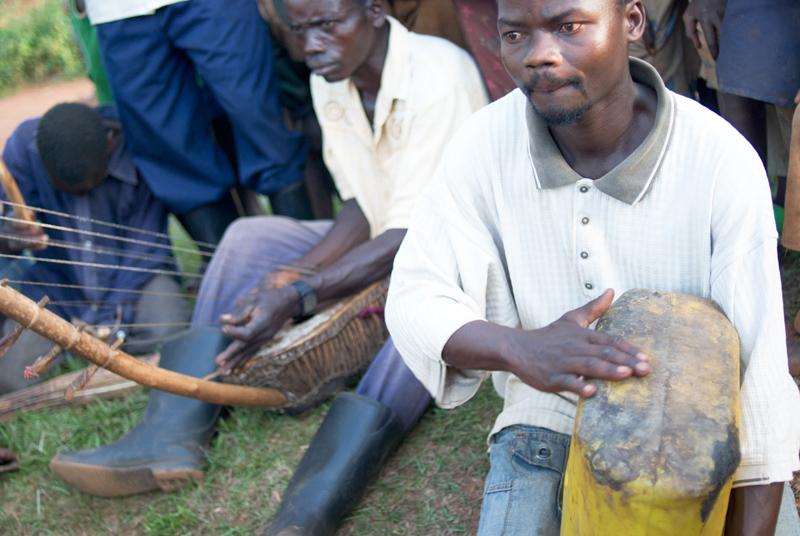The wet season had passed, but still the sky hung heavy and low over the Zombo district in northwest Uganda. Clouds rolled over the forested hills, filling the occasional dale with an opaque mist that blanketed everything in a perpetual dampness.
At its midday strength the sun could finally burn through the haze. In this brief window of daylight, the herders tethered their ambling goats, the planters inspected their ripening coffee cherries and the mothers accounted for their wandering children.
I too meandered in the midday sun, walking through the fields with a parade of local children behind me. Everywhere I ventured they followed, matching every step I took and repeating every word I said. Interrupting this perpetual game of follow-the-leader, a young boy in mud-stained jeans and a tattered Chicago Bulls t-shirt tapped my shoulder. He wanted to take me to his village. It was my turn to follow.
As we approached the village, the echoes of a noontime celebration grew louder. I intended to watch from the perimeter with camera in hand, but the young boy tugged me into the center of the dancing villagers. Their bloodshot eyes betrayed the amount of drink they had consumed.
A congregation of Alur farmers and laborers swayed to the beat of the music they produced. A rhythm sang from a bow harp, its wielder moving his fingers among the vibrating strings faster than my camera’s shutter could capture. Whistlers and fiddlers trilled a simple melody with an occasional deviating note that seemed as dissonant and distinctive as my presence. Hands clapped. Feet stomped. A percussionist pounded his water jug, its surface discolored by incessant use as a makeshift bongo. Children danced, and the men raised their bottles – nearly empty of the vice contained within – in recognition of the simple joys of an agronomic lifestyle.
A voice erupted from behind me – an old lady emerging from the recesses of her hut. Shrill as a crow, her pitch dominated the collective sound of the instrumental accompaniment, reverberating between the mudded sides of her humble home before escaping to the clouds above.
I didn’t understand her lyrics, but the very sound spoke of uplift to the translucent sky. The rains had poured in abundance. The fields were green with vegetation. This was a song of praise – a celebratory hymn for the fruit of the harvest, for the rain that had come and the sun that now pierced through its thinning veil.
– By Austin Price
The Emory Wheel was founded in 1919 and is currently the only independent, student-run newspaper of Emory University. The Wheel publishes weekly on Wednesdays during the academic year, except during University holidays and scheduled publication intermissions.
The Wheel is financially and editorially independent from the University. All of its content is generated by the Wheel’s more than 100 student staff members and contributing writers, and its printing costs are covered by profits from self-generated advertising sales.





Austin, this is outstanding. Keep writing. Keep shooting. You have a gift.